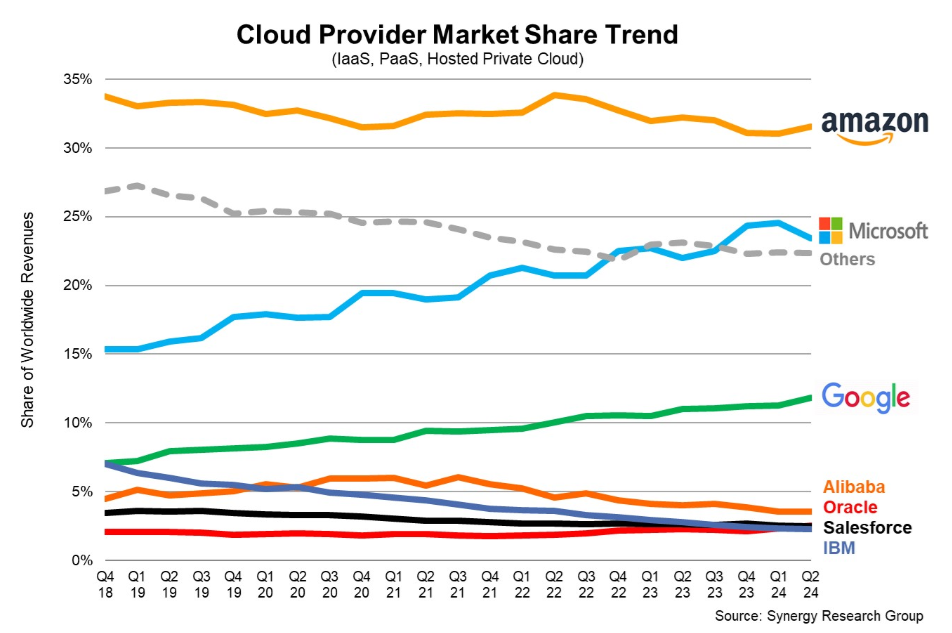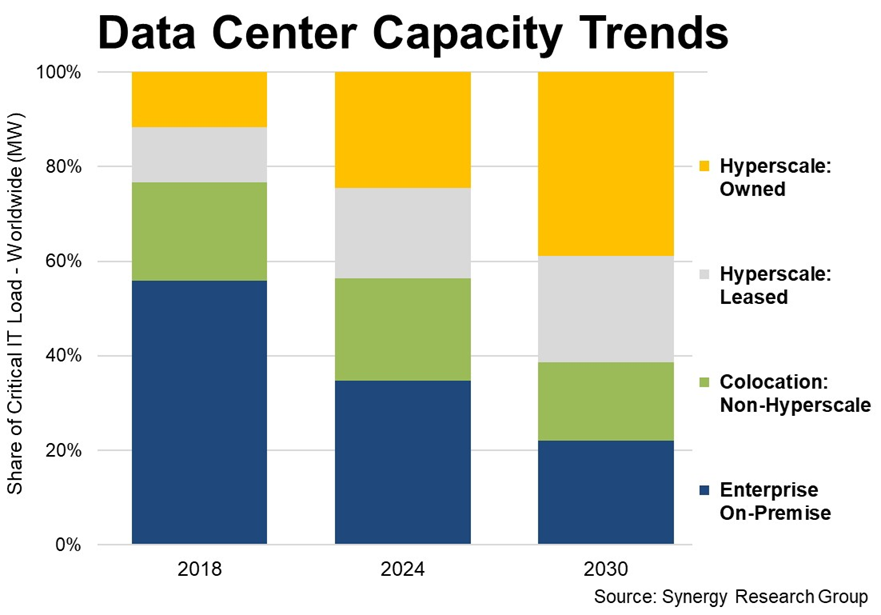Amazon, Azure and Google capture 65% of cloud infrastructure spending, with Amazon accounting for almost half of all spending with the big three cloud providers.
Amazon has 32% of the market, Microsoft 23%, and Google 10%, according to Canalys. Synergy Research Group puts the figures at 29% for AWS, 22% for Microsoft and 11% for Google in Q1 2025.
Why is AWS Losing Its Lead?

AWS was the first hyperscale cloud provider. Its first mover advantage has left it with more customers to lose than Azure or Google.
Microsoft has been gaining ground on AWS thanks to the software giant’s unrivalled network of half a million channel partners – mainly IT support firms. They are able to help firms of all sizes migrate workloads from legacy on-premises servers to Azure and Microsoft 365 hosted services. No other cloud provider has that advantage.
Google has used billions from its lucrative search engine to subsidise its cloud efforts, allowing it to target cost-conscious developers despite having inferior economies of scale to AWS and Azure.
Niche cloud providers like CoreWeave and Oracle have benefited from AI labs’ ravenous need for computing power. For example, Oracle will receive $30bn a year from OpenAI to supplement the latter’s computing capacity from Azure and Google.
Regulatory Concerns About Cloud Competition
The UK’s Competition and Markets Authority provisionally determined that “competition is not working as well as it could, and that improvements could make cloud services markets work better for UK businesses in terms of improved prices, quality and choice.” The CMA is considering whether AWS and Azure merit ‘strategic market status’ in the public cloud market. If so, the CMA has the power to impose conduct remedies.
Any regulatory interventions are likely to be limited and focused on niche areas such as data egress charges and software licensing terms.
Fiercer Competition Between AWS, Azure and Google Will Help Us All
The real protection against misuse of market power will come from competition. If Azure and Google continue to close the gap on AWS, that will do more to ensure value-for-money and service quality than any regulatory intervention.
The end result is likely to be three hyperscale clouds that are sustainably profitable but unable to abuse their market power.
This outcome would help your organisation even if it doesn’t use AWS, Azure or Google directly. You pay for these cloud services indirectly by buying from suppliers, such as SaaS providers, that build their offering on the biggest clouds. You also pay indirectly through your taxes, as large public sector bodies rely heavily on the big cloud providers.
A Growing Pie
It’s easy to look at the market share figures and wrongly assume smaller clouds are shrinking. They’ve lost 10% of market share over the past 7 years, and this fall is expected to continue. Synergy Research Group expects the hyperscalers’ share of data centre capacity to grow substantially by 2030.

However, spending on cloud hosting has grown by around 20% per year. The substantial decline in market share for non-hyperscale cloud providers doesn’t typically translate into lost revenues, just slower growth.
Giant Organisations’ Preference for Giant Clouds Creates a Misleading Impression
Giant multinationals, AI labs, and public sector bodies skew the aggregate market share figures, making it appear as though the big cloud providers are the only game in town.
While this may be true for giant customers with atypically complex or large requirements, it’s not true for most organisations, who don’t need that complexity.
Most organisations don’t need to host an app in 10 countries, just one
Limitless scalability isn’t of use to them, as they can’t afford massive increases in hosting costs.
They don’t have the time or money to rebuild their apps from scratch to be cloud-native.
They need advice on moving to the cloud. Hyperscalers’ self-service portals and online documentation aren’t enough.
So, demand for ‘other clouds’ will continue.
Competition is Alive and Well in the UK Hosting Mid-Market
You have plenty of choice when it comes to hosting your server-based applications. The big cloud providers remain a valid option. However, smaller hosting firms may offer something closer to what you need.
These smaller providers are large enough to build and support enterprise-grade hosting environments but small enough to offer a personal service markedly different to the cookie-cutter services offered by the largest cloud providers.
How Smaller Providers Are Differentiating Themselves from AWS and Other Big Clouds
Support – Some hosting providers offer 24/7 phone support as standard. This contrasts with the big clouds which require you to pay extra to receive such support.
Expert Advice – Smaller cloud providers may be able to offer personal guidance to organisations looking to shift to the cloud. The big clouds tend not to go there. If you need that sort of assistance, they expect you to write a large cheque to their consulting partners. That works well for investment banks and multinationals, but is unaffordable to many ordinary organisations. Smaller cloud providers, in contrast, provide expert guidance as part of their sales process and help clarify technical requirements.
More Than Hosting – Many smaller cloud hosting providers are able to offer hosting as part of a wider package. For example, they may be able to offer connectivity to your office, private cloud links, and colocation options. The big providers rarely offer such services and typically don’t support colocating your own servers or firewalls in their facility.
Extra Resilience – Some smaller cloud providers offer resilient hosting, where your workloads are hosted on a server cluster spread across multiple data centres. With the big clouds, you often have to do complicated things to arrange for your virtual machines to failover from one hyperscale data centre to another.
How Syntura Helps You Make the Most of the Cloud
We’ve got the knowledge and experience to ensure you make the most of AWS or Azure. We’re a partner of both AWS and Microsoft. We can help you migrate workloads to the public cloud and optimise your AWS/Azure resources to achieve cost-effectiveness, performance, resilience and security.
If the big public clouds aren’t right for you, Syntura has an alternative: resilient UK-based cloud hosting built on VMware, complete with 24/7 phone and email support and predictable monthly bills.
Need to back up your cloud? Syntura can ensure your data is automatically backed up to a secure offsite location.
If you would like expert help making the most of the cloud, talk to us. Call us on +44 (0)20 7847 4510 or email info@syntura.io.
